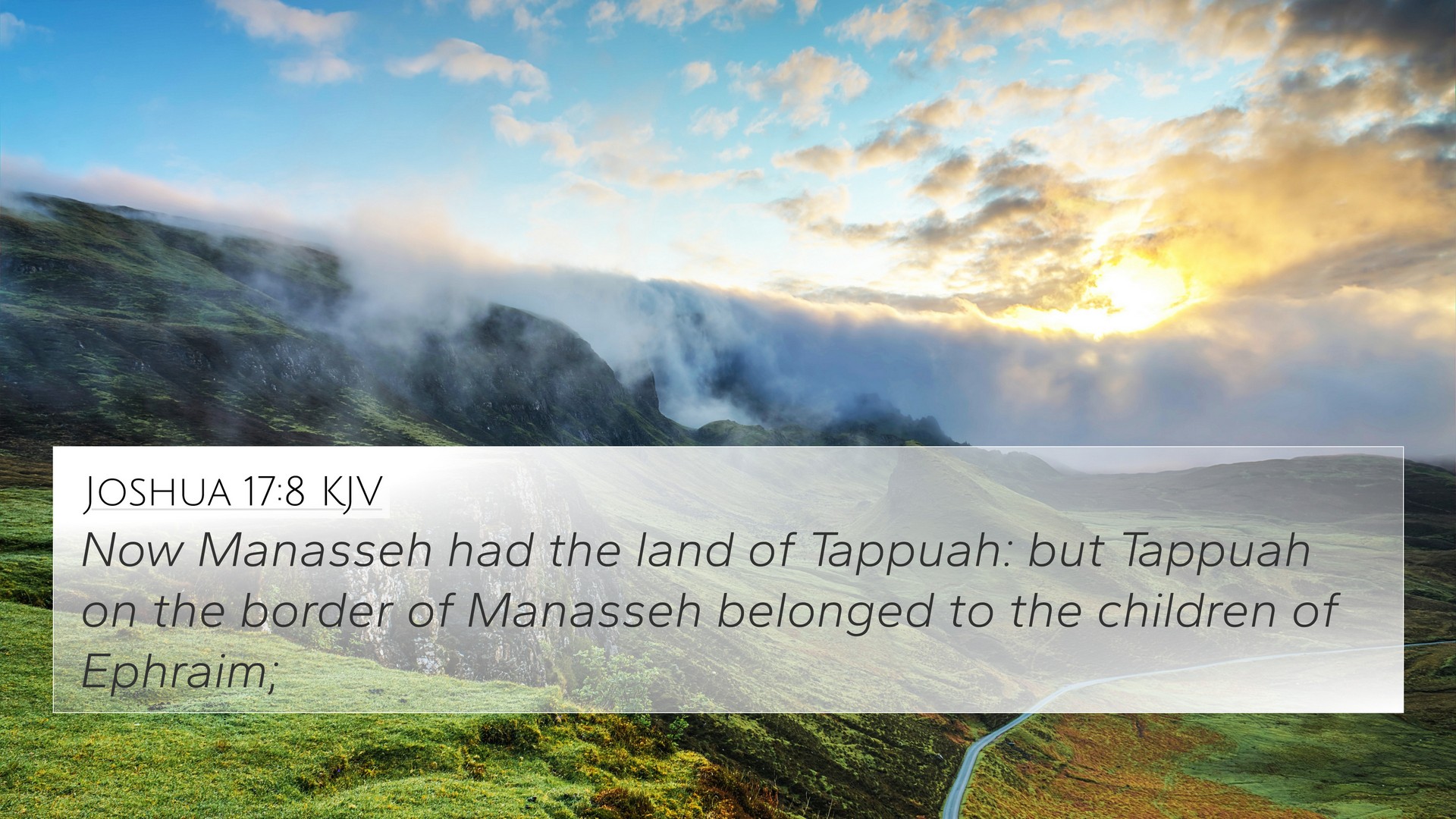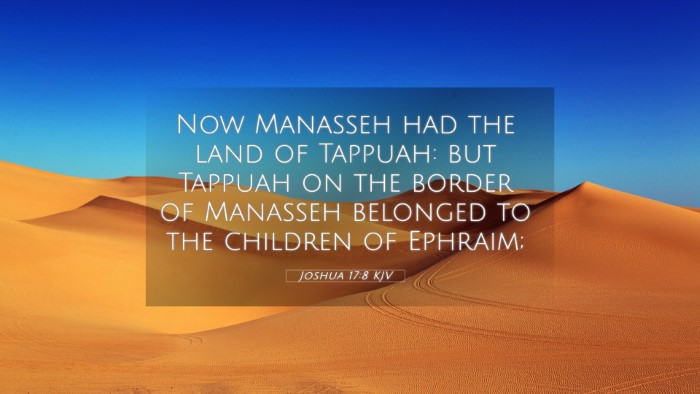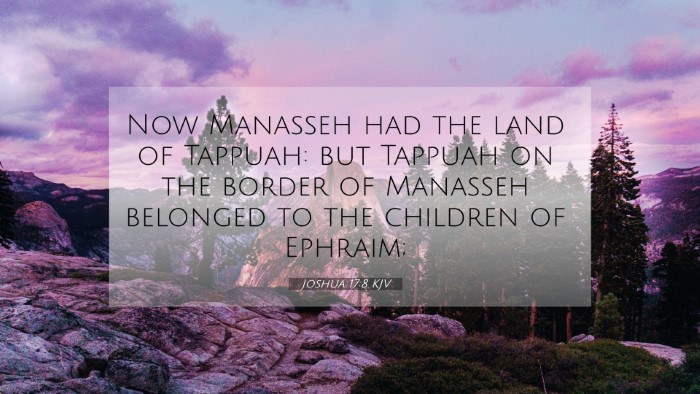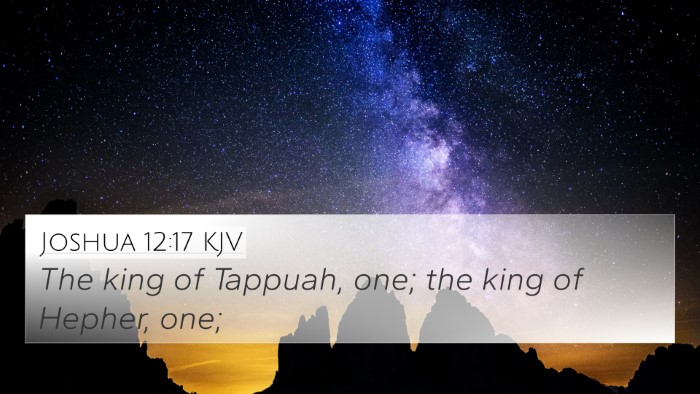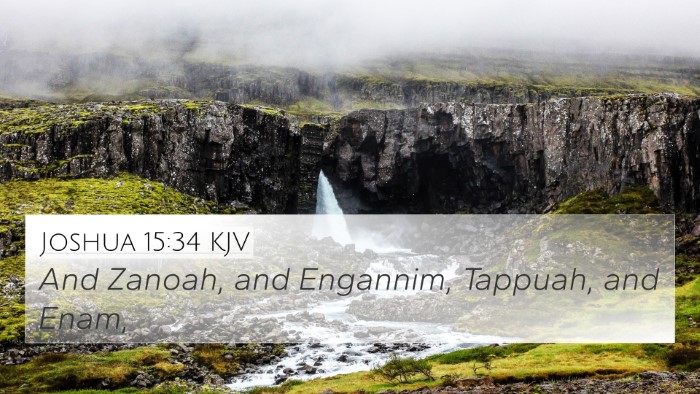Old Testament
Genesis Exodus Leviticus Numbers Deuteronomy Joshua Judges Ruth 1 Samuel 2 Samuel 1 Kings 2 Kings 1 Chronicles 2 Chronicles Ezra Nehemiah Esther Job Psalms Proverbs Ecclesiastes Song of Solomon Isaiah Jeremiah Lamentations Ezekiel Daniel Hosea Joel Amos Obadiah Jonah Micah Nahum Habakkuk Zephaniah Haggai Zechariah MalachiJoshua 17:8 Similar Verses
Joshua 17:8 Cross References
Now Manasseh had the land of Tappuah: but Tappuah on the border of Manasseh belonged to the children of Ephraim;
Uncover the Rich Themes and Topics of This Bible Verse
Listed below are the Bible themes associated with Joshua 17:8. We invite you to explore each theme to gain deeper insights into the Scriptures.
Joshua 17:8 Cross Reference Verses
This section features a detailed cross-reference designed to enrich your understanding of the Scriptures. Below, you will find carefully selected verses that echo the themes and teachings related to Joshua 17:8 KJV. Click on any image to explore detailed analyses of related Bible verses and uncover deeper theological insights.
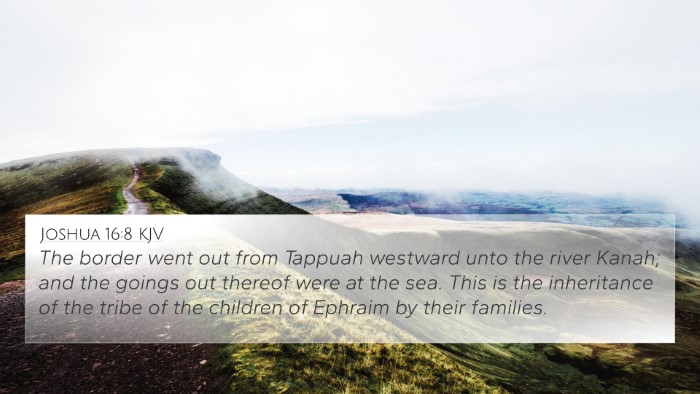
Joshua 16:8 (KJV) »
The border went out from Tappuah westward unto the river Kanah; and the goings out thereof were at the sea. This is the inheritance of the tribe of the children of Ephraim by their families.
Joshua 17:8 Verse Analysis and Similar Verses
Understanding Joshua 17:8
The verse Joshua 17:8 states:
"Now Manasseh had the land of Tappuah; but Tappuah on the border of Manasseh belonged to the children of Ephraim."
Verse Summary
This verse highlights the inheritance of the tribe of Manasseh, particularly focusing on the territory of Tappuah, which exhibits a unique situation within the distribution of land in Canaan. It reflects the complex dynamics of the tribal territories and their borders.
Commentary Analysis
Insights from Matthew Henry
Henry explains that the division of land reflects the providential ordering of God, and the mention of Tappuah indicates the overlapping territories of Ephraim and Manasseh. It shows how God's design for the tribes includes a measure of complexity, emphasizing the need for cooperation among the tribes.
Insights from Albert Barnes
Barnes comments on the geographical implications and the administrative considerations inherent in the land distribution. He notes the significance of borders in the ancient context and how they represent familial or tribal heritage.
Insights from Adam Clarke
Clarke reflects on the juxtaposition of the lands, interpreting it as a reminder of the shared responsibilities and relationships between the tribes of Israel. Clarke emphasizes that these territorial arrangements were designed for peace and coexistence.
Thematic Connections
The verse serves as a bridge to understanding broader themes in scripture, particularly regarding land, inheritance, and inter-tribal relations. Below are relevant connections with other scriptures:
- Genesis 48:14: Jacob's blessing of Ephraim and Manasseh lays the foundation for their inheritance.
- Numbers 32:33: Highlights the establishment of the tribes’ territories and their roles in the conquest of Canaan.
- Joshua 16:5: Discusses the boundaries of Ephraim, providing context to the territorial disputes mentioned in Joshua 17.
- Joshua 18:11: Details the allocation of land among the tribes, reinforcing the importance of boundaries.
- 1 Chronicles 5:23: Offers a retrospective view on the achievements and interactions of the tribe of Manasseh.
- Matthew 12:21: Relates to the prophetic significance of the tribes, echoing their roles in the New Testament.
- Hebrews 11:9: Speaks of faith in the promise of land, offering a spiritual parallel to the physical inheritance described in Joshua.
Cross-Referencing Biblical Texts
To fully understand Joshua 17:8, it is beneficial to engage in cross-referencing. Here are some tools and methods to enhance your understanding:
- Bible Concordance: Use a concordance to find related verses and understand keywords in context.
- Bible Cross-Reference Guide: This helps to trace themes and connections between scriptures.
- Cross-Reference Bible Study: Discussing scripture in study groups can unveil hidden connections.
- How to Use Bible Cross-References: Familiarize yourself with techniques to identify and explore cross-referenced verses.
- Bible Chain References: This method involves linking verses that substantiate each other, creating a chain of understanding.
Conclusion
Joshua 17:8 stands as a vital verse within the narrative of Israel's land allotment. By utilizing various commentaries and cross-referencing techniques, readers can appreciate the depth of its meaning and its relevance in understanding God's faithfulness in fulfilling His promises to His people.
Final Thoughts on Related Bible Verses
For those seeking deeper insight into verse relationships and interactions, here are additional verses that elucidate the themes of inheritance and shared territory:
- Exodus 6:8: God promises land to Israel, a theme that resonates throughout their journey.
- Deuteronomy 1:8: An invitation to take possession of the promised land, framing the context of Joshua's leadership.
- Joshua 1:6-9: The charge given to Joshua which emphasizes courage and the fulfillment of promises.
- Psalms 78:67-69: Reflects on how God chose specific tribes, shedding light on His divine purpose.
